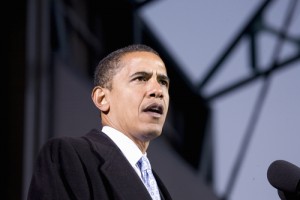
WASHINGTON – U.S. sanctions against a Russian bank and the Kremlin’s inner circle have pinched Moscow, but if the goal is to get President Vladimir Putin to roll his forces out of Crimea or deter him from doing any more land grabs, their effectiveness remains in doubt.
Putin has mocked the punitive steps President Barack Obama has taken so far in their post-Cold War game of chess – or chicken.
Putin made jokes of Obama’s decision this week to freeze the assets of businessmen with close ties to him as well as Bank Rossiya, which provides them support. Putin quickly retaliated by slapping travel restrictions on nine U.S. officials and lawmakers, including Sen. John McCain, who quipped: “I guess this means my spring break in Siberia is off.”
More serious repercussions loom if the standoff heats up.
For now, Putin says there is no need for further Russian retaliation, yet his Foreign Ministry said Moscow would “respond harshly.”
Putin claims to have no plans for further incursions into Ukraine or elsewhere in the neighbourhood. But he’s not planning to reverse Russia’s annexation of Crimea either.
The U.S. and Europe are left to weigh the possibility of levying tougher measures on Russia’s energy and banking sectors. That could backfire if Moscow, in turn, seized American or other foreign assets or cut exports of natural gas to Europe, which is heavily dependent on Russia for energy.
“If Russia doesn’t do anything other than what they’ve done so far with Crimea, I think the Obama administration will probably stand pat with the sanctions that it has already imposed,” said Richard Fontaine, president of the Washington-based Center for a New American Security. “I think they are waiting to see if this is the end of the Russian adventurism, or if there is more to come, and then they will react with more sanctions accordingly.”
By taking a step-by-step approach, the U.S. is giving Russia a chance to take the “diplomatic off-ramp” and resolve the crisis, Fontaine said. “The problem with that is that Putin has shown absolutely no appetite to take any off-ramp,” he said. “If the off-ramp means reversing what he’s done in Crimea, I don’t think these sanctions are going to achieve that.”
Just the threat of harsher sanctions has dampened the outlook for the Russian economy. Russian stocks were under pressure Friday as a second credit rating agency put the country on notice of a possible downgrade and Visa and MasterCard stopped serving two Russian banks, including Bank Rossiya.
The Russian stock market has lost more than 10 per cent this month amid growing tensions between Russia and the West. Russia said Friday it might scrap plans to tap international markets for money this year as it counts the cost of the sanctions.
The EU hit 12 more people with sanctions Friday over Russia’s annexation of Crimea, bringing its list of those facing visa bans and asset freezes to 33. They include one of Russia’s deputy prime ministers, a Putin adviser and the speaker of Russia’s upper house of Parliament, according to a document obtained by The Associated Press.
The EU roster fell short of the top-tier list of Putin associates the U.S. sanctioned, evidence that Europe is not as eager to punish its energy supplier and trade partner.
Sen. Dick Durbin, who went to Ukraine with McCain last week, called on Obama to rally the support of U.S. allies on sanctions. “To do it alone is very limited. To do it with our allies can have some impact on Putin,” he said.
McCain said the U.S. should provide financial aid to Ukraine, immediately send defensive weapons to the country, resume work on the missile defence system in Poland and develop a long-term plan to get energy to Europe and Ukraine.
“The higher price that Putin thinks he has to pay for further aggression, the more likely that he doesn’t act,” said McCain.
___
Associated Press writers Donna Cassata in Washington and Lynn Berry in Moscow contributed to this report.